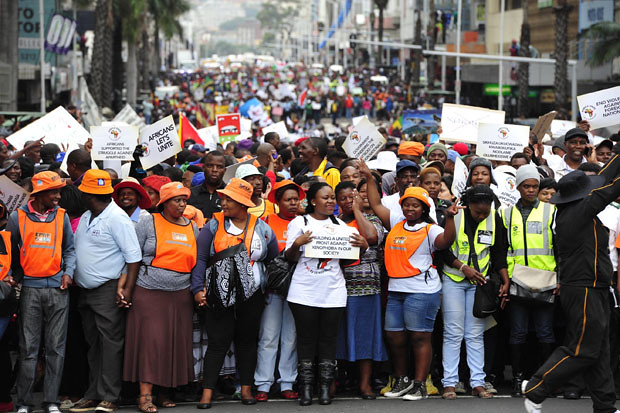South Africa- Fading Rainbow
September 27, 2019 | Expert Insights

Background
In the past few days, rioters wreaked havoc on the streets of Johannesburg, torching vehicles and looting shops that belonged to foreign nationals. About 70% of the foreign nationals in South Africa come from neighbouring countries - Nigeria, Zimbabwe, Mozambique and Lesotho. Another 30% is made up of people from Malawi, UK, Namibia, eSwatini (Swaziland), India and other countries.
The Nigerian expatriates seemed to be in the crosshairs of the attackers - out of the 12 fatalities reported so far, the majority were Nigerian nationals. Other victims included Ethiopians, Congolese, and Zimbabweans. Panic-struck Nigerians are being airlifted home under the aegis of the Nigerian government. There have been retaliatory attacks in Nigeria against South African businesses and the South African diplomatic missions in Lagos and Abuja have been temporarily closed. Since violence feeds on violence, there is the possibility that this vicious cycle will repeat itself.
Analysis
Dubbed as the “Rainbow Nation” by Archbishop Desmond Tutu, during the 1994 democratic elections, South Africa is struggling to live up to the legacy of its venerated leader Nelson Mandela as a haven for multi-racial diversities. The South African politician, Jeremy Cronin aptly summed up the realities of today’s South Africa when he said “Allowing ourselves to sink into a smug rainbowism will prove to be a terrible betrayal of the possibilities for real transformation, real reconciliation, and real national unity that are still at play in our contemporary South African reality.”
Although these latest attacks are gaining considerable media traction, there is nothing new about them. In 2015 there was a major outbreak of xenophobic violence in Durban, which resulted in seven fatalities. The attacks were allegedly incited by the Zulu King Zwethlini, who had accused foreigners for being responsible for the decrease in jobs and rising crime. However, even then the South African Human Rights Commission denied any link to xenophobic tendencies.
South Africa is the mecca for economic migrants from Africa seeking a better life. However, migrants have brought misery for the indigenous South Africans. Only one in three South Africans has a job and the crime rate is skyrocketing. So, it is no surprise that foreign migrants are drawing the ire of the locals. The downturn in the economic situation has not helped matters either.
Local township politics also play a part in stirring up xenophobic emotions. Community leadership has proven to be a lucrative vocation for many unemployed locals who with little positive achievements to their credit, deflect local frustrations on foreigners.
Another factor at play is the concept of South African exceptionalism or a feeling of superiority among South Africans in comparison to other Africans. This has created real embarrassment as South Africa has fostered a world view of itself as the guardian of human dignity irrespective of colour and creed. The Rainbow Nation is now being accused of reverse apartheid against its poorer African cousins, and not without cause.
Until recently, the South African government refused to call these type of incidents xenophobic attacks and labelled it as mere acts of criminality. Incidentally, the country holds the dubious distinction of having one of the highest rates of murder and gender crimes in the world.
Speaking on South African Heritage Day, President Cyril Ramphosa emphasised the need to pursue unity in diversity, challenging the perception that South Africa is Xenophobic and unsafe for women. The President cancelled his trip to the United Nations General assembly and has sent envoys to seven of the disgruntled African states to set matters right. Most of these nations had provided asylum to South Africa’s political leaders and activists during the Apartheid era.
Assessment
- As President Trump is fond of saying, globalisation is dead and it is now the time of nationalists. Rising expectations faced with declining realities have made citizens xenophobic. This is not confined to developing countries like South Africa and India. Rich nations like the US under Trump and the EU besieged by migrants from the Middle East are equally afflicted. With little hope for the improvement of the world economy, xenophobic trends will be the rule of the day in times to come.
- In comparison to the other African countries, South Africa has a fairly stable political atmosphere, however, the state of the economy makes it hard to support their own populace and local resentment against foreigners is likely to last, unless the economy accelerates appreciably.
- One of the most crippling shortcomings of African nations is the lack of industry and this directs migration routes towards more industrialised countries either within Africa or outside. The service industry too has made very little impact and hence the economic migrations across borders will continue to stress the polities.
- Post-1994, national integration in South Africa has been painted with a romanticism that does not translate practically. South Africa has different tribes in different regions and the system of integration must begin from the grassroots. The top-down approach from the constitution is of diluted value which can only benefit identity politics.
Image Courtesy: flickr.com








Comments